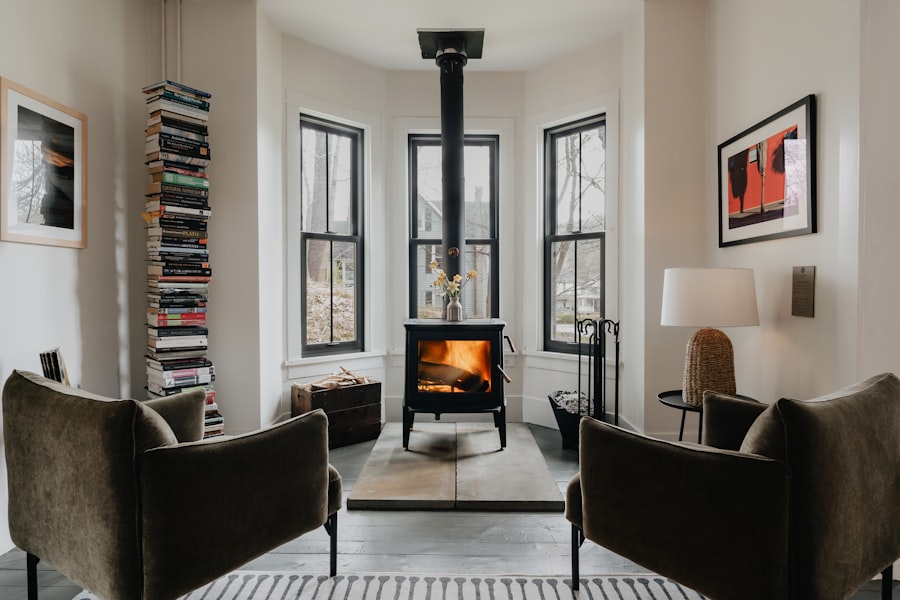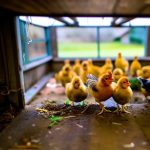Chickens have specific requirements for optimal health and well-being, particularly during winter. These include:
1. A warm, dry environment to protect against cold and damp conditions.
2. Access to fresh water and a balanced diet to maintain health and egg production. 3.
Adequate space for movement and natural behaviors, even in inclement weather. 4. Protection from frostbite and hypothermia, which can occur in cold temperatures.
5. Consideration of breed-specific cold tolerance levels. 6.
Access to natural light or supplemental lighting to maintain circadian rhythms and egg production during shorter winter days. Understanding and addressing these needs is crucial for maintaining a healthy and comfortable flock throughout the winter months. Proper care during this season involves making informed decisions based on the specific requirements of chickens in cold weather.
Table of Contents
- 1 Providing appropriate shelter for chickens
- 2 Insulating the chicken coop
- 3 Using heat sources for extra warmth
- 4 Providing adequate bedding for chickens
- 5 Ensuring access to fresh water in cold weather
- 6 Monitoring the health and behavior of chickens
- 7 FAQs
- 7.1 What are the best ways to keep chickens warm through winter?
- 7.2 How can I insulate my chicken coop for winter?
- 7.3 Is it safe to use heat lamps or heated pads for chickens in winter?
- 7.4 What temperature is too cold for chickens in winter?
- 7.5 How can I ensure good ventilation in the chicken coop during winter?
Key Takeaways
- Chickens need extra care in winter due to their susceptibility to cold temperatures
- Providing a well-ventilated but draft-free shelter is crucial for chickens in winter
- Insulating the chicken coop with materials like straw or hay can help retain heat
- Heat sources like heat lamps or heated pads can be used to provide extra warmth in the coop
- Adequate bedding such as straw or wood shavings can help keep chickens warm and dry in winter
- Ensuring access to unfrozen water is essential for the health and well-being of chickens in cold weather
- Regularly monitoring the health and behavior of chickens is important to catch any issues early on
Providing appropriate shelter for chickens
Key Features of a Well-Constructed Coop
The coop should be well-ventilated to prevent moisture buildup, but also draft-free to keep the chickens warm. Additionally, the coop should be spacious enough to allow the chickens to move around comfortably and engage in natural behaviors, such as scratching and dust bathing.
Regular Cleaning and Maintenance
It’s important to regularly clean the coop to prevent the buildup of moisture and ammonia from chicken droppings, which can lead to respiratory issues in chickens.
Providing Access to the Outdoors
In addition to a well-constructed coop, chickens also benefit from access to an outdoor run or yard, even in winter. Providing a secure outdoor space allows the chickens to get fresh air and exercise, which is important for their physical and mental well-being. If your climate experiences heavy snowfall or freezing temperatures, consider providing a covered or enclosed run to protect the chickens from the elements while still allowing them access to the outdoors. By providing appropriate shelter for your chickens, you can help them stay healthy and comfortable throughout the winter.
Insulating the chicken coop

Insulating the chicken coop is an effective way to help keep your flock warm and comfortable during the winter months. Proper insulation helps retain heat and prevent drafts, creating a more stable and comfortable environment for the chickens. Insulation can be added to the walls, ceiling, and floor of the coop to help maintain a consistent temperature inside.
Common insulation materials include foam board, fiberglass batts, or recycled denim insulation. It’s important to ensure that any insulation materials used are non-toxic and safe for chickens. In addition to insulating the coop itself, it’s also important to insulate any windows or vents to prevent drafts while still allowing for adequate ventilation.
Adding weather-stripping around doors and windows can help seal out drafts and retain heat inside the coop. It’s important to regularly check the insulation for any signs of damage or wear and tear, as damaged insulation may not be as effective at retaining heat. By properly insulating the chicken coop, you can help create a more comfortable and energy-efficient environment for your flock during the winter months.
Using heat sources for extra warmth
In some climates, providing supplemental heat sources may be necessary to keep chickens warm during particularly cold weather. Heat sources such as heat lamps, radiant heaters, or heated pads can help provide extra warmth inside the coop. It’s important to use caution when using heat sources in the chicken coop, as they can pose a fire hazard if not used properly.
Ensure that any heat sources are securely installed and kept away from flammable materials such as bedding or nesting materials. When using heat sources in the chicken coop, it’s important to monitor the temperature regularly to ensure that it remains within a safe range for the chickens. Avoid overheating the coop, as this can lead to respiratory issues in chickens.
Additionally, it’s important to provide a backup heat source in case of power outages or equipment failure. By using heat sources responsibly and monitoring the temperature inside the coop, you can help provide your flock with extra warmth during cold weather.
Providing adequate bedding for chickens
Providing adequate bedding for chickens is essential for keeping them warm and comfortable during the winter months. Bedding helps insulate the coop floor, providing a barrier between the chickens and the cold ground. Common bedding materials include straw, wood shavings, or shredded paper.
It’s important to regularly clean and replace bedding to prevent moisture buildup and odors, which can lead to respiratory issues in chickens. In addition to providing insulation, bedding also provides a soft and comfortable surface for chickens to rest on. Chickens spend a significant amount of time resting and sleeping, so providing comfortable bedding is important for their overall well-being.
It’s important to ensure that bedding materials are dry and free from mold or mildew, as damp bedding can lead to health issues in chickens. By providing adequate bedding for your flock, you can help keep them warm, comfortable, and healthy during the winter months.
Ensuring access to fresh water in cold weather

Preventing Water from Freezing
In winter, it’s important to prevent water from freezing by using heated waterers or regularly replacing frozen water with fresh water.
Maintaining Waterers
It’s also important to regularly check waterers for any signs of damage or wear and tear that could lead to leaks or malfunctions. In addition to preventing water from freezing, it’s important to ensure that waterers are placed in a location that is sheltered from wind and precipitation. This helps prevent water from freezing as quickly and keeps it accessible to the chickens throughout the day.
Importance of Fresh Water for Health and Egg Production
Providing access to fresh water is essential for maintaining the health and egg production of your flock during the winter months.
Monitoring the health and behavior of chickens
Monitoring the health and behavior of your chickens is essential for identifying any issues or concerns that may arise during the winter months. Keep an eye out for signs of illness or distress, such as lethargy, decreased appetite, or abnormal behavior. Additionally, regularly check your flock for signs of frostbite on their combs, wattles, or feet, especially in cold climates.
It’s also important to monitor egg production and quality during the winter months. Chickens may lay fewer eggs in winter due to shorter daylight hours and colder temperatures, but a significant decrease in egg production could indicate an underlying health issue. By monitoring the health and behavior of your flock, you can quickly identify and address any issues that may arise during the winter months.
In conclusion, understanding the specific needs of chickens in winter is crucial for providing appropriate care and ensuring their health and well-being during the colder months. By providing appropriate shelter, insulation, heat sources, bedding, and access to fresh water, you can help your flock stay warm, comfortable, and healthy throughout the winter. Additionally, monitoring their health and behavior allows you to quickly identify and address any issues that may arise.
With proper care and attention, you can help your chickens thrive even in the coldest of winters.
If you’re looking for a way to keep your chickens warm through the winter, you might want to consider building an A-frame chicken coop. This type of coop is designed to provide insulation and protection from the elements, making it an ideal choice for cold weather. For more information on A-frame chicken coops, check out this article on Poultry Wizard’s website: A-Frame Chicken Coop.
FAQs
What are the best ways to keep chickens warm through winter?
Some of the best ways to keep chickens warm through winter include providing a well-insulated coop, using heat lamps or heated pads, and ensuring good ventilation while avoiding drafts.
How can I insulate my chicken coop for winter?
You can insulate your chicken coop for winter by adding extra bedding, sealing any drafts, and using insulating materials such as foam board or straw bales.
Is it safe to use heat lamps or heated pads for chickens in winter?
It is safe to use heat lamps or heated pads for chickens in winter as long as they are installed properly and monitored regularly to prevent any fire hazards.
What temperature is too cold for chickens in winter?
Chickens can tolerate cold temperatures, but it is generally recommended to keep the coop above freezing (32°F or 0°C) to prevent frostbite and other cold-related health issues.
How can I ensure good ventilation in the chicken coop during winter?
You can ensure good ventilation in the chicken coop during winter by providing adjustable vents, keeping the coop clean and dry, and avoiding excessive moisture buildup.
Meet Walter, the feathered-friend fanatic of Florida! Nestled in the sunshine state, Walter struts through life with his feathered companions, clucking his way to happiness. With a coop that’s fancier than a five-star hotel, he’s the Don Juan of the chicken world. When he’s not teaching his hens to do the cha-cha, you’ll find him in a heated debate with his prized rooster, Sir Clucks-a-Lot. Walter’s poultry passion is no yolk; he’s the sunny-side-up guy you never knew you needed in your flock of friends!







